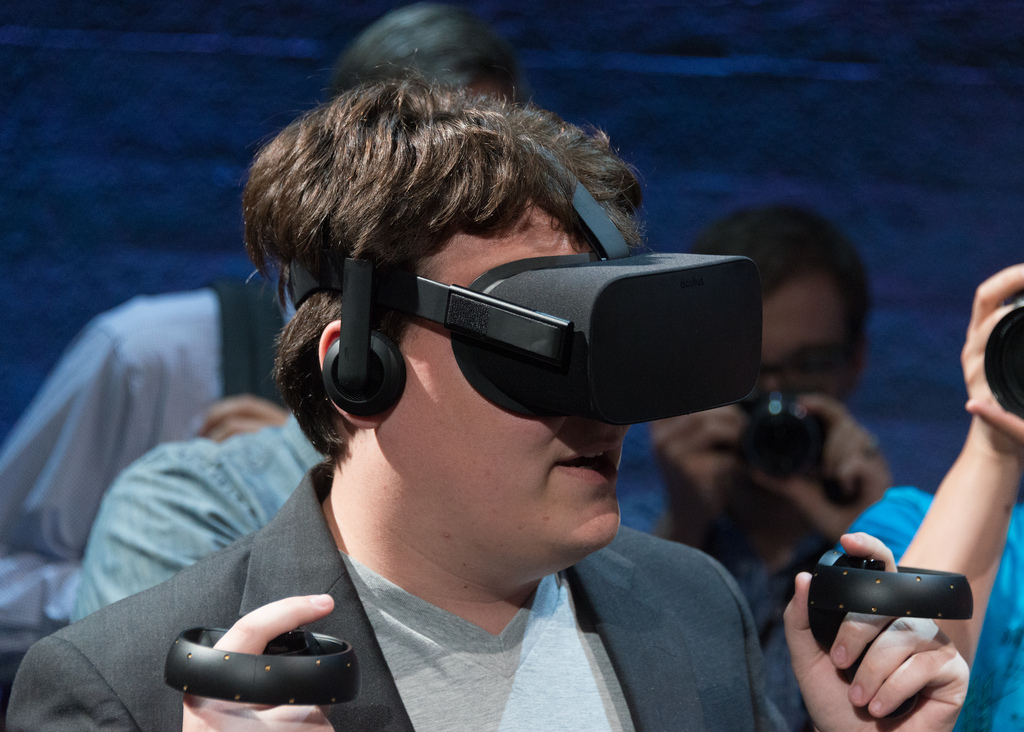Palmer Luckey was one of the founders of the startup Oculus, which Facebook acquired in 2014 for $ 2 billion. Luckey is also one of the inventors of the virtual reality helmet Oculus Rift.
"Palmer's legacy extends beyond Oculus, his inventive spirit helped launch the modern VR revolution and build the industry from scratch. We are grateful for everything he did for Oculus and virtual reality technologies, and we wish him all the best", - said Facebook in a statement.
Luckey independently created the first prototype of the VR helmet in garage of the parents' home and communicating with other enthusiasts in the field of electronics in online forums. Luckey was very unhappy with the image quality that the virtual reality monitors transmitted, and dissatisfied with low contrast, a long delay time and a small viewing angle.
In contrast to existing devices, in 2011, at the age of 18, he created the first prototype in the garage of his parents and named it CR1, the field of view was 90 degrees. Over the next 10 months, he developed a series of prototypes, adding features such as 3D, wireless connection to the game console and a 270-degree view, while reducing the size and weight.
He posted regular reports on his progress on the forum MTBS3D, popular among VR enthusiasts. Luckey called his project Rift, the product of which was a set for self-assembling a VR helmet. Luckey’s development eventually drew attention of the legendary veteran of the game industry John Carmack.
News about the new gadget quickly spread among creators of video games and VR gadgets. By June 2013, Oculus VR received $ 16 million of investment and a valuation of $ 30 million. Six months later, the company's valuation increased to $ 300 million.
In January 2014, Mark Zuckerberg become interested in Oculus VR, and personally visited the company’s office to get acquainted with the device. As a result of two-month negotiations in March 2014, Oculus VR was acquired by Facebook for $ 2.4 billion, $ 400 million paid in real money, the rest - in Facebook’s shares.
In February 2017, the court ordered Facebook to pay ZeniMax $ 500 million, ruling that Luckey violated the non-disclosure agreement. Plaintiffs from ZeniMax claimed compensation of $ 2 billion for the fact that Oculus allegedly used its technology to create its own VR-glasses.
In the fall of 2016, Lucky found himself in the middle of a scandal when the media reported that he secretly sponsored a project that circulated memes against US presidential candidate Hillary Clinton.
In January 2017, VR-department of Facebook was headed by Hugo Barra, former Vice President of Xiaomi.
source: theguardian.com
"Palmer's legacy extends beyond Oculus, his inventive spirit helped launch the modern VR revolution and build the industry from scratch. We are grateful for everything he did for Oculus and virtual reality technologies, and we wish him all the best", - said Facebook in a statement.
Luckey independently created the first prototype of the VR helmet in garage of the parents' home and communicating with other enthusiasts in the field of electronics in online forums. Luckey was very unhappy with the image quality that the virtual reality monitors transmitted, and dissatisfied with low contrast, a long delay time and a small viewing angle.
In contrast to existing devices, in 2011, at the age of 18, he created the first prototype in the garage of his parents and named it CR1, the field of view was 90 degrees. Over the next 10 months, he developed a series of prototypes, adding features such as 3D, wireless connection to the game console and a 270-degree view, while reducing the size and weight.
He posted regular reports on his progress on the forum MTBS3D, popular among VR enthusiasts. Luckey called his project Rift, the product of which was a set for self-assembling a VR helmet. Luckey’s development eventually drew attention of the legendary veteran of the game industry John Carmack.
News about the new gadget quickly spread among creators of video games and VR gadgets. By June 2013, Oculus VR received $ 16 million of investment and a valuation of $ 30 million. Six months later, the company's valuation increased to $ 300 million.
In January 2014, Mark Zuckerberg become interested in Oculus VR, and personally visited the company’s office to get acquainted with the device. As a result of two-month negotiations in March 2014, Oculus VR was acquired by Facebook for $ 2.4 billion, $ 400 million paid in real money, the rest - in Facebook’s shares.
In February 2017, the court ordered Facebook to pay ZeniMax $ 500 million, ruling that Luckey violated the non-disclosure agreement. Plaintiffs from ZeniMax claimed compensation of $ 2 billion for the fact that Oculus allegedly used its technology to create its own VR-glasses.
In the fall of 2016, Lucky found himself in the middle of a scandal when the media reported that he secretly sponsored a project that circulated memes against US presidential candidate Hillary Clinton.
In January 2017, VR-department of Facebook was headed by Hugo Barra, former Vice President of Xiaomi.
source: theguardian.com





